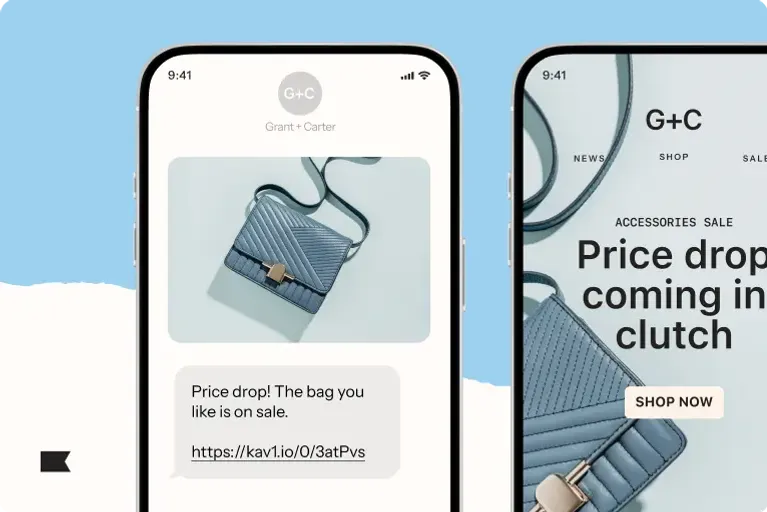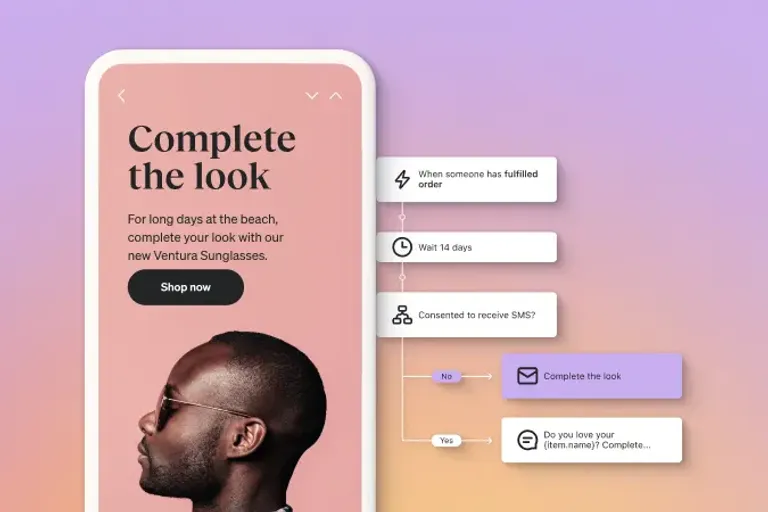When used in a way that delights French subscribers, SMS is an incredibly powerful channel for ecommerce brands.
In fact, based on a 2024 Klaviyo study, 70% of French shoppers who subscribe to SMS marketing have made at least one purchase after getting a text.
But brands aren’t achieving this success without proper strategy. To leverage SMS marketing successfully, it’s essential to understand and comply with specific regulations specific to France that protect customer privacy and ensure ethical marketing practices.
Want to provide a compliant and memorable experience over text for your French customers? You came to the right place.
Before diving into the specifics, a quick disclaimer: This guide should not be relied on as legal advice. Klaviyo encourages you to work with your legal counsel to make sure your SMS program is compliant with the laws that apply to it.
See the results from our latest consumer survey on how over 5,000 Europeans across 13 countries want to engage over text.
SMS compliance laws in France
Several key regulations and organisations shape SMS marketing compliance in France.
Each of these regulatory powers have their own compliance requirements, some unique and some overlapping.
Sound overwhelming? There’s no way around it: SMS regulations in France can be a lot to keep track of—with nuance that’s critical to understand before sending your first text.
Fortunately, we’ve collected a list of the main requirements you need to be aware of to keep everything straight.
Working with SMS providers with deep SMS compliance knowledge also helps—which is why over 8,000 brands rely on Klaviyo SMS.
Klaviyo also builds local regulations into the platform to help you create smarter, already-compliant segments so you can focus on your customers, not ever-changing laws.
Regardless of what technology you use, having a solid understanding of what SMS compliance looks like in France helps you establish better, safer relationships with your customers.
6 key steps to SMS compliance laws in France
1. Obtain explicit consent
Consent is the cornerstone of compliant SMS marketing. Under GDPR and French regulations, you must obtain explicit, written consent from recipients before sending marketing messages. This consent should be:
- Freely given: Customers must have a real choice and not be coerced or unduly incentivised.
- Specific: Separate consents are required for different types of marketing, such as email and SMS.
- Informed: Clear, prominent explanations of what the person is agreeing to are necessary.
Klaviyo’s smart opt-in feature now supports double opt-in, providing an additional layer of compliance.
SMS consent template
When you ask for consent, consider including language like this: “I consent to receiving customised SMS marketing offers and transactional SMS updates from <YOUR BRAND NAME> until I withdraw my consent by contacting customer service at <URL or CONTACT DETAILS>, clicking on the unsubscribe link within the text, or replying to an SMS with STOP. Sending a message costs the standard local network rate. For further information on the processing of your personal data, please see <Privacy URL>.”
2. Ensure easy opt-out
Customers should be able to easily revoke their consent. In France, with Klaviyo’s alphanumeric sender IDs, users can opt-out via a click URL or by contacting customer care.
Unlike some other countries, replying “STOP” will not opt users out of SMS marketing, so timely processing of these user’s opt-out requests is crucial for brands to maintain compliance.
3. Clearly identify your brand
Transparency is key. When sending SMS messages, you must clearly identify your brand. With Klaviyo SMS, all SMS messages are sent with an alphanumeric sender ID, which allows your brand name to be displayed as the sender, ensuring recipients know who is contacting them.
However, two minor French SMS carriers, SYMA and Lebara France, do not support Alpha Sender ID delivery and messages will deliver on a 5 digit shortcode. It is best practice therefore to include a prefix on all messages to ensure recipients can identify the sender of all messages on all networks.
4. Respect carrier quiet hours
To avoid disturbing customers, French regulations prohibit sending SMS marketing messages:
- Sundays
- During French holidays
- Between 10 PM and 8 AM on other days
Klaviyo queues messages sent during these times for delivery at the next available window, ensuring compliance.
Does this include transactional SMS messages?
No, transactional SMS messages like a welcome series and order update will not be affected by the above carrier quiet hour rule. These types of messages are not marketing by nature and therefore can compliantly be delivered without delay.
5. Avoid prohibited content
Certain content types are strictly prohibited in French SMS marketing and you cannot include them in any brand communications.
The types of content to avoid in your texts:
- Cannabis and related products (including CBD)
- Gambling-related messages (e.g., for casinos)
- Adult content, including sex toys
6. Write messages in French
When sending to a French audience, your texts should be in their language. If you’re sending texts in more than one language, learn how to segment SMS subscribers by country in Klaviyo. You may also be interested in customising content based on language to target the correct profiles based on specific languages.
Key regulatory bodies
Several organisations play a vital role in shaping and enforcing SMS marketing compliance in France:
- General Data Protection Regulation (GDPR)
- Commission nationale de l’informatique et des libertés (CNIL)
- French Data Protection Act (the Act)
- ePrivacy Directive
- French Postal and Electronic Communications Code (CPCE)
- loi sur la confiance dans l’économie numérique (LCEN)
- French Consumer Code
- EDPB Guidelines
- Major mobile networks (Orange, SFR, Bouygues Telecom, Free Mobile, NRJ Mobile, Lycamobile, Syma Mobile)
When considering sending marketing text messages in France, you must ensure that all of your messages fit the criteria that each of these organisations sets out.
Different types of SMS marketing sender IDs in France
In France, companies are required to use a sender ID when sending SMS messages. A sender ID is how your brand is displayed when the subscriber gets a text from you.
In this text from Balibaris, you can see that their brand name is displayed at the top of the mobile phone. This is an example of an alphanumeric sender ID.
In France there are 3 types of sender IDs:
- Alphanumeric or branded: your company name
- Short code: a 5-6 digit number
- Long code: a 10 digit number
Each comes with certain limitations. For example, subscribers are not able to respond to an alphanumeric sender ID. If you want your subscribers to be able to respond to your texts when using an alphanumeric sender ID, consider adding a short or long code contact number to your text.
Additionally, short code sender IDs carry exceptionally long activation times and heavy costs with Throughput, increasing with the more you pay.
Finally, long code sender IDs are currently reserved for P2P SMS traffic therefore are not able to handle large volume campaign sending.
As previously mentioned, Klaviyo SMS exclusively uses alphanumeric sender IDs to keep costs low for brands while maintaining high volume sending.
Start sending compliant SMS messages that convert
Ready to send text messages that inspire your customers to make more purchases? Combine your newfound compliance knowledge with an SMS provider that offers:
- Optimised boilerplate opt-in language
- Easy quiet hours sending
- Segmentation that double checks for consent
- Alphanumeric sender IDs that automatically include mandatory opt-out
Start sending texts to your French audience.



